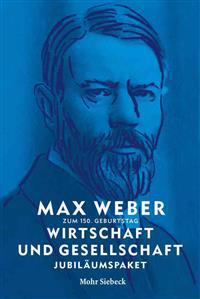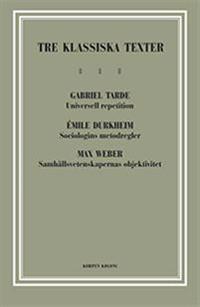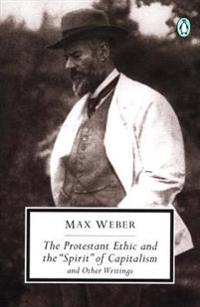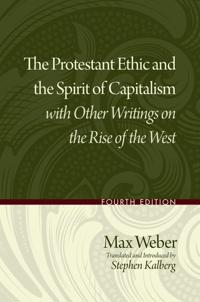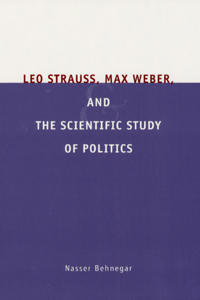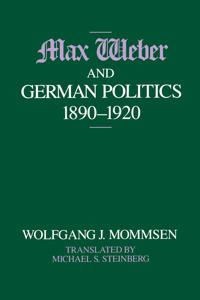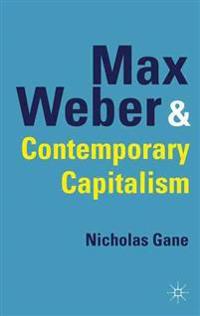From Max Weber (Storpocket)
avMax Weber
ISBN: 9780415482691 - UTGIVEN: 200901Max Weber (1864-1920) was one of the most prolific and influential sociologists of the twentieth century. This classic collection draws together his key papers. This edition contains a new preface by Professor Bryan S. Turner.[...]
Max Weber-Studienausgabe: Band I/17: Wissenschaft ALS Beruf (1917/19). Politik ALS Beruf (1919) (Häftad)
avMax Weber, Wolfgang J. Mommsen, Birgit Morgenbrod
ISBN: 9783161458132 - UTGIVEN: 1994-12English summary: Weber's famous speeches which he delivered to students in Munich at the end of his life, are presented together in a historical critical edition for the first time. Included are also a newspaper report of Science as a Vocation and the notes Weber used for Politics as a Vocation Thro[...]
Max Weber-Studienausgabe: Band I/22,3: Wirtschaft Und Gesellschaft. Recht (Häftad)
avMax Weber, Werner Gephart, Georg Hermes
ISBN: 9783161523281 - UTGIVEN: 2014-08Dieser Band der Weber-Studienausgabe bietet zwei zum Grundrissbeitrag Webers gehorige Manuskripte, die der rechtlichen Sphare gewidmet sind: ein als "Die Wirtschaft und die Ordnungen" uberschriebener Text sowie ein nicht betiteltes langeres Textkonvolut, das als sog. "Rechtssoziologie" uberliefert i[...]
Max Weber-Studienausgabe: Band I/22,1-5 + I/23: Wirtschaft Und Gesellschaft. Jubilaumspaket (6 Bande) (Häftad)
avMax Weber, Eckart Otto
ISBN: 9783161532221 - UTGIVEN: 2014-10English summary: Max Weber's Economy and Society, which is the unfinished result of a ten-year-long creative period, is published here in the form of a completely new and authoritative critical edition. In contrast to previous editions by Marianne Weber and Johannes Winckelmann, Max Weber's Complete[...]
Tre klassiska texter : Tarde, Durkheim, Weber (Storpocket)
avGabriel Tarde, Émile Durkheim, Max Weber
ISBN: 9789186923013 - UTGIVEN: 201209Omkring sekelskiftet 1800/1900 var vetenskaperna om samhället i färd med att anta den form som vi känner dem vid i dag. I denna volym tillgängliggörs nu tre texter som står för fundamentalt olika sätt att närma sig frågorna om hur samhället kan studeras. Dessa texter uppmuntrar oss att ta[...]
The Protestant Ethic and the Spirit of Capitalism (Pocket)
avMax Weber, Stephen Kalberg, Max Weber
ISBN: 9780199747252 - UTGIVEN: 201007For more than 100 years, Max Weber's The Protestant Ethic and the Spirit of Capitalism has set the parameters for the debate over the origins of modern capitalism. Now more timely and thought provoking than ever, this esteemed classic of twentieth-century social science examines the deep cultural "f[...]
General Economic History (Pocket)
avMax Weber, Frank Hyneman Knight, Max Weber
ISBN: 9780486425146 - UTGIVEN: 2003-02Conceptos sociológicos fundamentales / Fundamental sociological concepts (Pocket)
avMax Weber, Joaquín Abellán (TRN) García, Max Weber
ISBN: 9788420688909 - UTGIVEN: 2014-06Layout Look Book 2 (Inbunden)
avMax Weber
ISBN: 9780061995118 - UTGIVEN: 200905Organized so as to encourage creativity, serendipitous discovery, and inspiration, "Ink Attack" is an essential guide to layout design for both amateur and professional designers. The book includes techniques that can be used to enhance any layout, as well as insights into the factors that help to m[...]
The Protestant Ethic and Other Writings (Storpocket)
avMax Weber
ISBN: 9780140439212 - UTGIVEN: 200512In "The Protestant Ethic", Max Weber opposes the Marxist concept of dialectical materialism and relates the rise of the capitalist economy to the Calvinist belief in the moral value of hard work and the fulfillment of one's worldly duties.[...]
From Max Weber: Essays in Sociology (häftad)
ISBN: 9780195004625 - UTGIVEN: 1958-12An introduction to the work of the greatest German sociologist and a key figure in the development of present-day sociological thought.[...]
The Protestant Ethic and the Spirit of Capitalism with Other Writings on the Rise of the West (Häftad)
avMax Weber
ISBN: 9780195332537 - UTGIVEN: 200812For more than 100 years, The Protestant Ethic and the Spirit of Capitalism has set the parameters for the debate over the origins of modern capitalism. Now more timely and thought-provoking than ever, this esteemed classic of twentieth-century social science examines the deep cultural "frame of mind[...]
Max Weber and The Protestant Ethic (Inbunden)
avPeter Ghosh
ISBN: 9780198702528 - UTGIVEN: 2014-11Max Weber and The Protestant Ethic: Twin Histories presents an entirely new portrait of Max Weber, one of the most prestigious social theorists in recent history, using his most famous work, The Protestant Ethic and the "Spirit" of Capitalism, as its central point of reference. It offers an intellec[...]
Max Weber and the Protestant Ethic
ISBN: 9780198807667 - UTGIVEN: 2017-08Max Weber and The Protestant Ethic: Twin Histories presents an entirely new portrait of Max Weber, one of the most prestigious social theorists in recent history, using his most famous work, The Protestant Ethic and the "Spirit" of Capitalism, as its central point of reference. It offers an intellec[...]
Leo Strauss, Max Weber, and the Scientific Study of Politics (Pocket)
avNasser Behnegar
ISBN: 9780226041438 - UTGIVEN: 2005-07Almost three decades after Leo Strauss's death, Nasser Behnegar offers the first sustained exposition of what Strauss was best known for: his radical critique of contemporary social science - particularly of political science. Behnegar argues that Strauss was not averse to the scientific study of po[...]
Max Weber and German Politics (Pocket)
avWolfgang J. Mommsen, Michael (TRN) Steinberg, Wolfgang J. Mommsen
ISBN: 9780226533995 - UTGIVEN: 1990-07A major work of German historiography, this comprehensive account of Weber's political views and activities reveals that, paradoxically, Weber was at once an ardent liberal and a determined German nationalist and imperialist. Wolfgang J. Mommsen shows the important links between these seemingly conf[...]
Max Weber (Pocket)
avFritz K. Ringer
ISBN: 9780226720050 - UTGIVEN: 2004-10A comprehensive introduction to Weber's thought. Fritz Ringer locates Weber in his historical context, relating his ideas to the controversies and politics of his day and considers the importance of Weber to contemporary life.[...]
Max Weber and Contemporary Capitalism (Inbunden)
avNicholas Gane
ISBN: 9780230242036 - UTGIVEN: 2012-09This book turns back to a famous classical source - the work of Max Weber - in order to think in new ways about capitalism today. By reading between Weber and a range of contemporary theorists, including Gilles Deleuze, Ulrich Beck and Zygmunt Bauman, it is argued that the on-going value of Weber's [...]
Max Weber and Karl Marx (Häftad)
avKarl Lowith
ISBN: 9780415093811 - UTGIVEN: 199309Karl Lowith was the son of a Munich artist and studied philosophy and biology in Munich, Freiburg and Marburg. He began his teaching career in 1928 as Privatdozent in Marburg, working under Heidegger, but was forced to leave in 1934. After two years in Rome he held a chair at Tohku University, Sen[...]
Money, Time and Rationality in Max Weber (Inbunden)
avStephen D. Parsons
ISBN: 9780415246934 - UTGIVEN: 2003-04-10Parsons argues that Weber's analysis is highly influenced by the Austrian School of Economics and the relationship between his critique of centrally planned economies and that of Mises. This book is a valuable contribution to Weberian literature.[...]
The Protestant Ethic And The Spirit Of Capitalism (Pocket)
avMax Weber
ISBN: 9780415254069 - UTGIVEN: 2001-05-17Widely considered as the most informed work ever written on the social effects of advanced capitalism, this remarkable volume holds its own as one of the most significant books of the twentieth century.[...]
Max Weber (Häftad)
avFrank Parkin
ISBN: 9780415285292 - UTGIVEN: 200209Relates the categories of Weber's social thinking to the intellectual context of legal thinking and theory in which he was educated. As such, this is the only account of the key sources of Weber's sociology of law.[...]
Max Weber (Inbunden)
ISBN: 9780415478984 - UTGIVEN: 201203Weber's methodological writings form the bedrock of key ideas across the social sciences. His discussion of value freedom and value commitment, causality, understanding and explanation, theory building and ideal types have been of fundamental importance, and their impact remains undiminished today. [...]
Max Weber on Capitalism, Bureaucracy and Religion (Pocket)
avStanislav (EDT) Andreski
ISBN: 9780415489539 - UTGIVEN: 2008-10For this important selection from Weber, sections of text from Weber's major works (Gesammelte, Aufsatze Zur Religionssoziologie, including The Protestant Ethic and the Spirit of Capitalism; General Economic History; and The Agrarian Sociology of Ancient Civilisations) have been carefully edited and[...]




